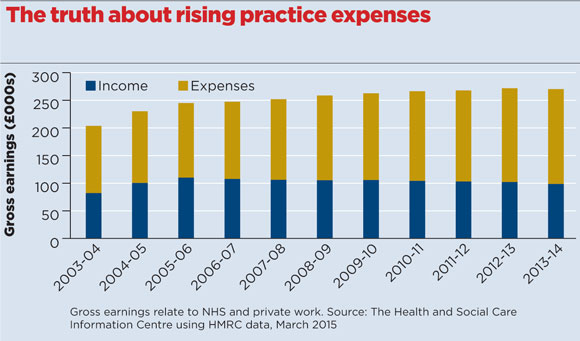GPs asked to make more efficiencies – but how?

NHS England has said GP practices should be asked to make further efficiency savings before any funding uplift is considered for next year, in its official submission to the independent pay review body.
NHS bosses called on the Review Body on Doctors’ and Dentists’ Remuneration (DDRB) ‘to consider what, if any, uplift is appropriate for 2016/17’ and rehashed the argument they made in last year’s submission, which said there was a concern that a funding uplift ‘would not necessarily’ lead to a pay rise for salaried GPs because their pay ‘may not be automatically uprated’.
They insisted GPs were different to other providers in that they are able to ‘influence the level of profits that their practices generate’ and added that they had ‘a choice to reduce expenses by creating efficiencies’.
GP practices have suffered real-terms funding cuts in eight out of the past nine years, and GP leaders warned in their DDRB submission that workforce problems ‘will continue to worsen’ and that any funding uplift should reflect the need to ‘recruit and retain’ GPs.
But according to NHS England, GP workload in terms of the number of patients cared for per full-time GP has fallen by 6.7% over the past 10 years, and managers also claimed there had been ‘a small reduction in the number of hours worked’.
However, their submission did acknowledge that there had been ‘workload increases’ for GPs linked to treating more elderly patients. The other main points of the NHS England evidence were:
- The Government’s 1% public sector pay cap applies to everyone.
- Unlike other groups, independent contractor GPs can increase income by taking on additional work.
- Practices have a ‘choice’ to reduce expenses by creating efficiencies, including working at scale and sharing back-office functions, or by hiring clinical pharmacists and other support staff to absorb workload.
But GPC chair Dr Chaand Nagpaul dismissed the claim that GP practices could find further efficiencies as ‘ridiculous’.
NHS England’s evidence also acknowledged the trend for rapid increases in GPs’ indemnity costs, but added: ‘It does not necessarily follow that, just because a particular expenses category has increased in the past – or appears to be doing so currently, as in the case of professional indemnity insurance – we should automatically fund any increase relating to that going forward’.
The DDRB’s final report to ministers is expected early next year.










